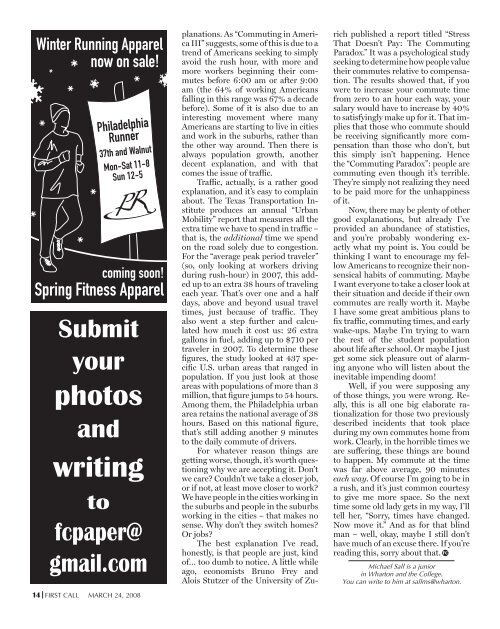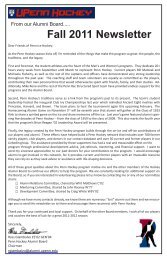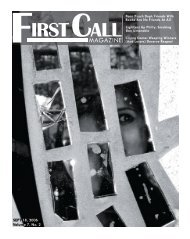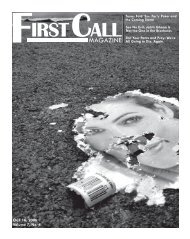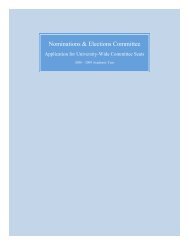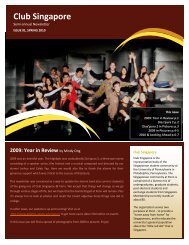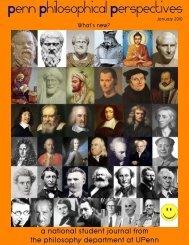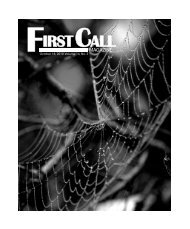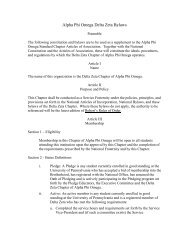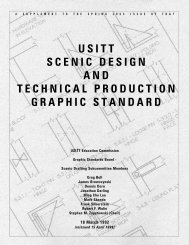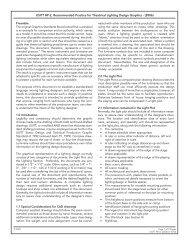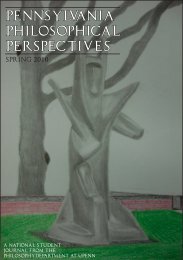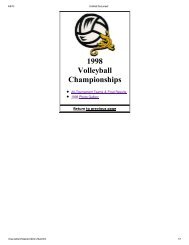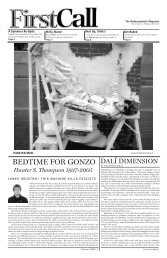MAGAZINE - Dolphin.upenn.edu - University of Pennsylvania
MAGAZINE - Dolphin.upenn.edu - University of Pennsylvania
MAGAZINE - Dolphin.upenn.edu - University of Pennsylvania
Create successful ePaper yourself
Turn your PDF publications into a flip-book with our unique Google optimized e-Paper software.
Submit<br />
your<br />
photos<br />
and<br />
writing<br />
to<br />
fcpaper@<br />
gmail.com<br />
14 FIRST CALL MARCH 24, 2008<br />
planations. As “Commuting in America<br />
III” suggests, some <strong>of</strong> this is due to a<br />
trend <strong>of</strong> Americans seeking to simply<br />
avoid the rush hour, with more and<br />
more workers beginning their commutes<br />
before 6:00 am or after 9:00<br />
am (the 64% <strong>of</strong> working Americans<br />
falling in this range was 67% a decade<br />
before). Some <strong>of</strong> it is also due to an<br />
interesting movement where many<br />
Americans are starting to live in cities<br />
and work in the suburbs, rather than<br />
the other way around. Then there is<br />
always population growth, another<br />
decent explanation, and with that<br />
comes the issue <strong>of</strong> traffic.<br />
Traffic, actually, is a rather good<br />
explanation, and it’s easy to complain<br />
about. The Texas Transportation Institute<br />
produces an annual “Urban<br />
Mobility” report that measures all the<br />
extra time we have to spend in traffic –<br />
that is, the additional time we spend<br />
on the road solely due to congestion.<br />
For the “average peak period traveler”<br />
(so, only looking at workers driving<br />
during rush-hour) in 2007, this added<br />
up to an extra 38 hours <strong>of</strong> traveling<br />
each year. That’s over one and a half<br />
days, above and beyond usual travel<br />
times, just because <strong>of</strong> traffic. They<br />
also went a step further and calculated<br />
how much it cost us: 26 extra<br />
gallons in fuel, adding up to $710 per<br />
traveler in 2007. To determine these<br />
figures, the study looked at 437 specific<br />
U.S. urban areas that ranged in<br />
population. If you just look at those<br />
areas with populations <strong>of</strong> more than 3<br />
million, that figure jumps to 54 hours.<br />
Among them, the Philadelphia urban<br />
area retains the national average <strong>of</strong> 38<br />
hours. Based on this national figure,<br />
that’s still adding another 9 minutes<br />
to the daily commute <strong>of</strong> drivers.<br />
For whatever reason things are<br />
getting worse, though, it’s worth questioning<br />
why we are accepting it. Don’t<br />
we care? Couldn’t we take a closer job,<br />
or if not, at least move closer to work?<br />
We have people in the cities working in<br />
the suburbs and people in the suburbs<br />
working in the cities – that makes no<br />
sense. Why don’t they switch homes?<br />
Or jobs?<br />
The best explanation I’ve read,<br />
honestly, is that people are just, kind<br />
<strong>of</strong>… too dumb to notice. A little while<br />
ago, economists Bruno Frey and<br />
Alois Stutzer <strong>of</strong> the <strong>University</strong> <strong>of</strong> Zurich<br />
published a report titled “Stress<br />
That Doesn’t Pay: The Commuting<br />
Paradox.” It was a psychological study<br />
seeking to determine how people value<br />
their commutes relative to compensation.<br />
The results showed that, if you<br />
were to increase your commute time<br />
from zero to an hour each way, your<br />
salary would have to increase by 40%<br />
to satisfyingly make up for it. That implies<br />
that those who commute should<br />
be receiving significantly more compensation<br />
than those who don’t, but<br />
this simply isn’t happening. Hence<br />
the “Commuting Paradox”: people are<br />
commuting even though it’s terrible.<br />
They’re simply not realizing they need<br />
to be paid more for the unhappiness<br />
<strong>of</strong> it.<br />
Now, there may be plenty <strong>of</strong> other<br />
good explanations, but already I’ve<br />
provided an abundance <strong>of</strong> statistics,<br />
and you’re probably wondering exactly<br />
what my point is. You could be<br />
thinking I want to encourage my fellow<br />
Americans to recognize their nonsensical<br />
habits <strong>of</strong> commuting. Maybe<br />
I want everyone to take a closer look at<br />
their situation and decide if their own<br />
commutes are really worth it. Maybe<br />
I have some great ambitious plans to<br />
fix traffic, commuting times, and early<br />
wake-ups. Maybe I’m trying to warn<br />
the rest <strong>of</strong> the student population<br />
about life after school. Or maybe I just<br />
get some sick pleasure out <strong>of</strong> alarming<br />
anyone who will listen about the<br />
inevitable impending doom!<br />
Well, if you were supposing any<br />
<strong>of</strong> those things, you were wrong. Really,<br />
this is all one big elaborate rationalization<br />
for those two previously<br />
described incidents that took place<br />
during my own commutes home from<br />
work. Clearly, in the horrible times we<br />
are suffering, these things are bound<br />
to happen. My commute at the time<br />
was far above average, 90 minutes<br />
each way. Of course I’m going to be in<br />
a rush, and it’s just common courtesy<br />
to give me more space. So the next<br />
time some old lady gets in my way, I’ll<br />
tell her, “Sorry, times have changed.<br />
Now move it.” And as for that blind<br />
man – well, okay, maybe I still don’t<br />
have much <strong>of</strong> an excuse there. If you’re<br />
reading this, sorry about that. FC<br />
Michael Sall is a junior<br />
in Wharton and the College.<br />
You can write to him at sallms@wharton.


